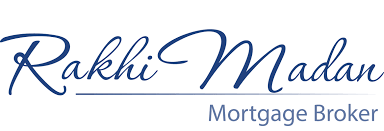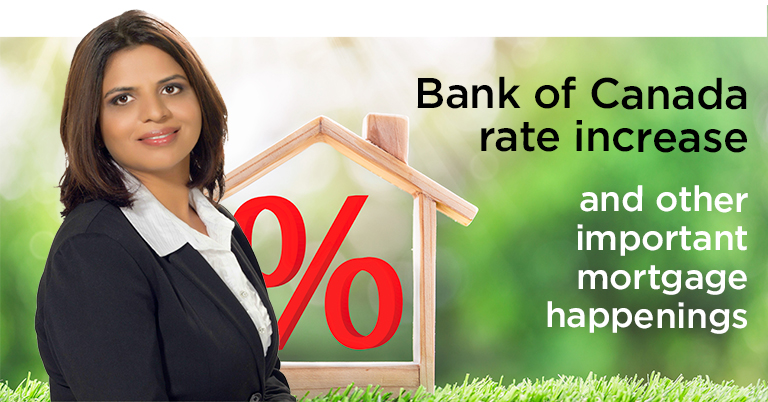On March 2nd, the very anticipated increase to the Bank of Canada benchmark rate materialized, going up a quarter point to 0.5%. It was our first rate hike since 2018 and was inevitable given our surging inflation of over 5%, which is a 30 year high.
Soon after, all the big five banks announced that their prime rate was rising by the same amount to 2.70%. This means that variable rate mortgages will see their payments increase accordingly. For every $100,000 of your mortgage, your payment will increase by $12 to $13. If you have a variable that keeps the payment amount steady, which you may prefer, you’ll be affected by paying less principal but more interest, which lengthens your amortization so it will take longer to pay off your mortgage.
How quickly the increase gets implemented varies by lender, but you should expect the change within the next 30 days. If you have a fixed rate mortgage, your rate or payment amount do not change until maturity. Additionally, fixed rates are set by government bond yields and not the Bank of Canada benchmark rate.
The next Bank of Canada rate announcement is just around the corner, on April 13th and further increases are expected. Economists are anticipating between three and four additional quarter-point rate hikes this year, with some going as high as five rate increases.
The Bank also noted that Canada’s economic growth had surpassed its expectations in the fourth quarter of 2021, which is good news, although the Ukrainian war is a scary wildcard. Could this terrible world shock move us toward a recession where the Bank of Canada stops or slows the progression of rate increases? Yes, anything is possible. This shows why it is virtually impossible to predict the future of interest rates.
Even with this rate hike, we still have a big gap between fixed and variable rates, so variable rates remain very popular. According to Mortgage Professionals Canada, about three-quarters of mortgages were fixed in 2020, yet last year about 40 percent of new mortgages went variable.
Based on current rates, we’d need five or six more rate hikes for fixed and variable to be equal. Those who choose variable decide to pay less now. The premise being – why pay more until you have to? An excellent variable rate strategy is to set your payment at what it would be if you went with a fixed rate, thereby paying down your principal faster and building a buffer for later.
I continue to believe that there is no need to panic about this rate increase or the upcoming rate hikes because we are simply returning to pre-pandemic levels. If you have a variable mortgage and are thinking of locking in to a fixed rate, keep in mind that there are risks. If you need to get out of your mortgage early, the prepayment penalties can be significantly higher with a fixed mortgage. This is something that needs to be considered given that up to 6 in 10 fixed mortgages are broken before maturity. And often the conversion rate is not very competitive. If you are unsure, please get in touch for a review of your situation. It is important to be comfortable and confident in your mortgage strategy.
If you need a new mortgage and aren’t sure whether to go fixed or variable, I’d be happy to have a discussion and a review of your circumstances, so you get the mortgage that meets your current need and comfort level.
If you are thinking of refinancing your mortgage to pay off high interest debt or for other needs, you may want to do so at today’s rates that won’t be around that much longer. Get in touch for your personalized cost/benefit analysis.
I always like to remind clients that an important strategy whether your mortgage is fixed or variable is to always use your prepayment privileges when you can, which means you are putting money down directly on your principal. You’ll pay less total interest and pay your mortgage off sooner. It’s a great wealth building strategy.
Other important mortgage related happenings affecting the market:
- According to a recent study by the Ontario Real Estate Association, twenty-nine percent of those 18 to 38 years who purchased a home were given a financial gift and 25% were given a loan. On average, the gifts were $73,606 and the loans $40,879. Parents also helped with moving and/or closing costs, and with mortgage payments. This large transfer of wealth is having a definite affect on our hot housing market in Brampton, Toronto and the GTA.
- Rising rates do not affect your ability to get a mortgage because the government mandated stress test requires that all borrowers qualify at a much higher rate. The mortgage lender must use the higher interest rate of either 5.25% or the lender’s contract rate plus 2%.
- An important trend to follow to anticipate the housing market trajectory in Toronto, Brampton and the GTA may not be rising rates but, instead, unemployment. One of the worst real estate crashes occurred in 1990 and while rates were high, the primary cause was soaring unemployment. Perhaps we should start watching and keying in on the unemployment rate instead of being overly concerned with rates returning to pre-pandemic levels, although several rounds of rate increases will likely have a slowing effect on the market.
- Rate holds have become very important right now in the face of rising rates.
- If you get a rate hold for a fixed mortgage, you are protected for up to 120 days should rates rise. Keep in mind that this isn’t a commitment, and you aren’t obliged to go through with that particular lender. You are simply protected against rising rates. Should rates drop you would of course be eligible for that lower rate. There are other benefits too like knowing how much you qualify for and what your payments will be.
- When it comes to variable rates, you can’t protect the actual rate from increasing because it is based on the prime rate that fluctuates according to the Bank of Canada benchmark rate, but you can protect the discount to prime, which history has shown can change quickly.
- Buying a home with a friend is another strategy some are using to get into the market. Not only is the downpayment and mortgage payment split, but also the ongoing expenses to run the home.
Contact me if you are in Brampton, Toronto or the GTA to discuss your purchase, renewal, or refinance. I am always up to date on the ever-changing mortgage environment and as Brampton’s top rated Mortgage Broker, I will make sure you get the best deal for your situation and the best advice on how to save money and achieve your long-term homeownership and financial goals. I’m here to help you!


